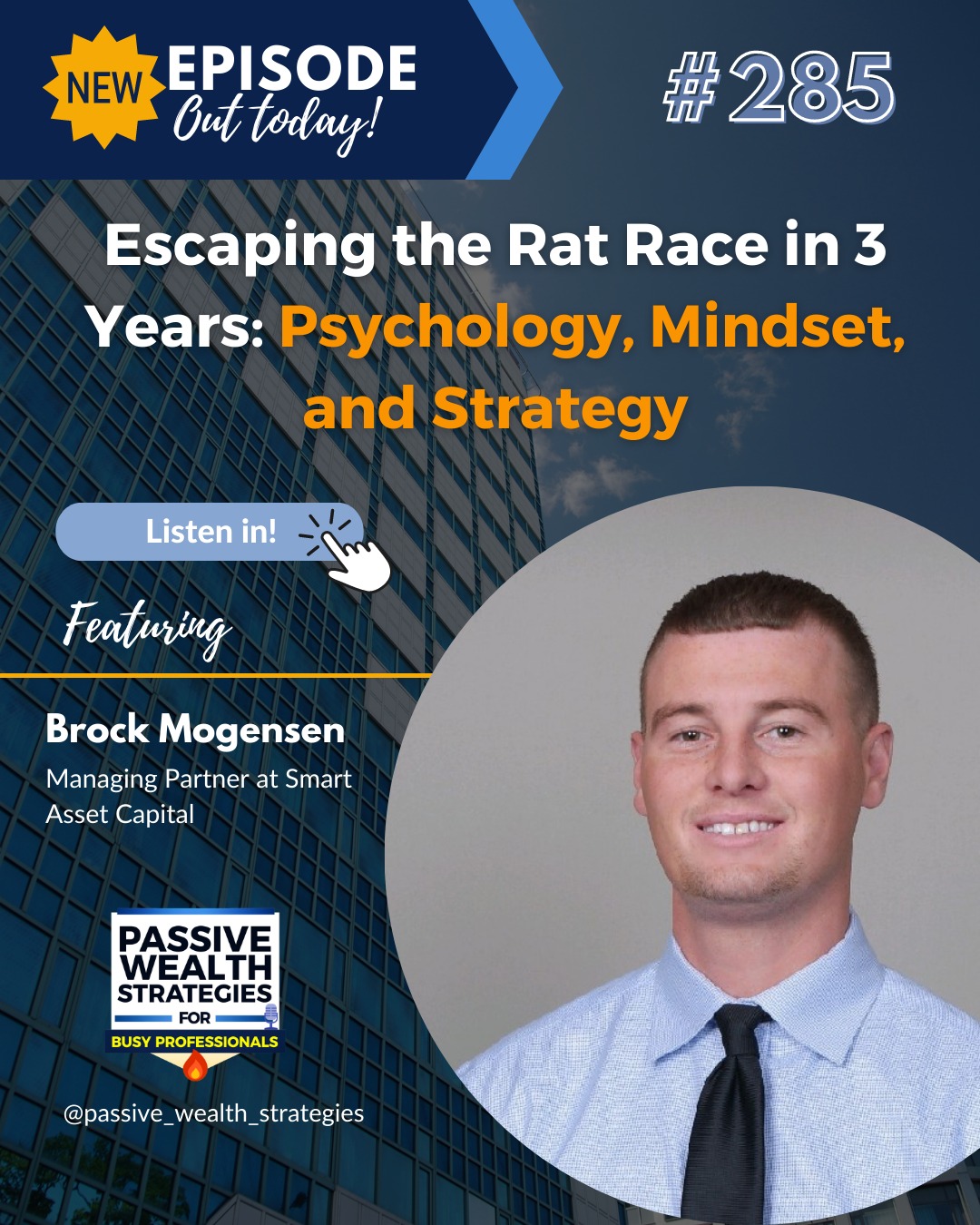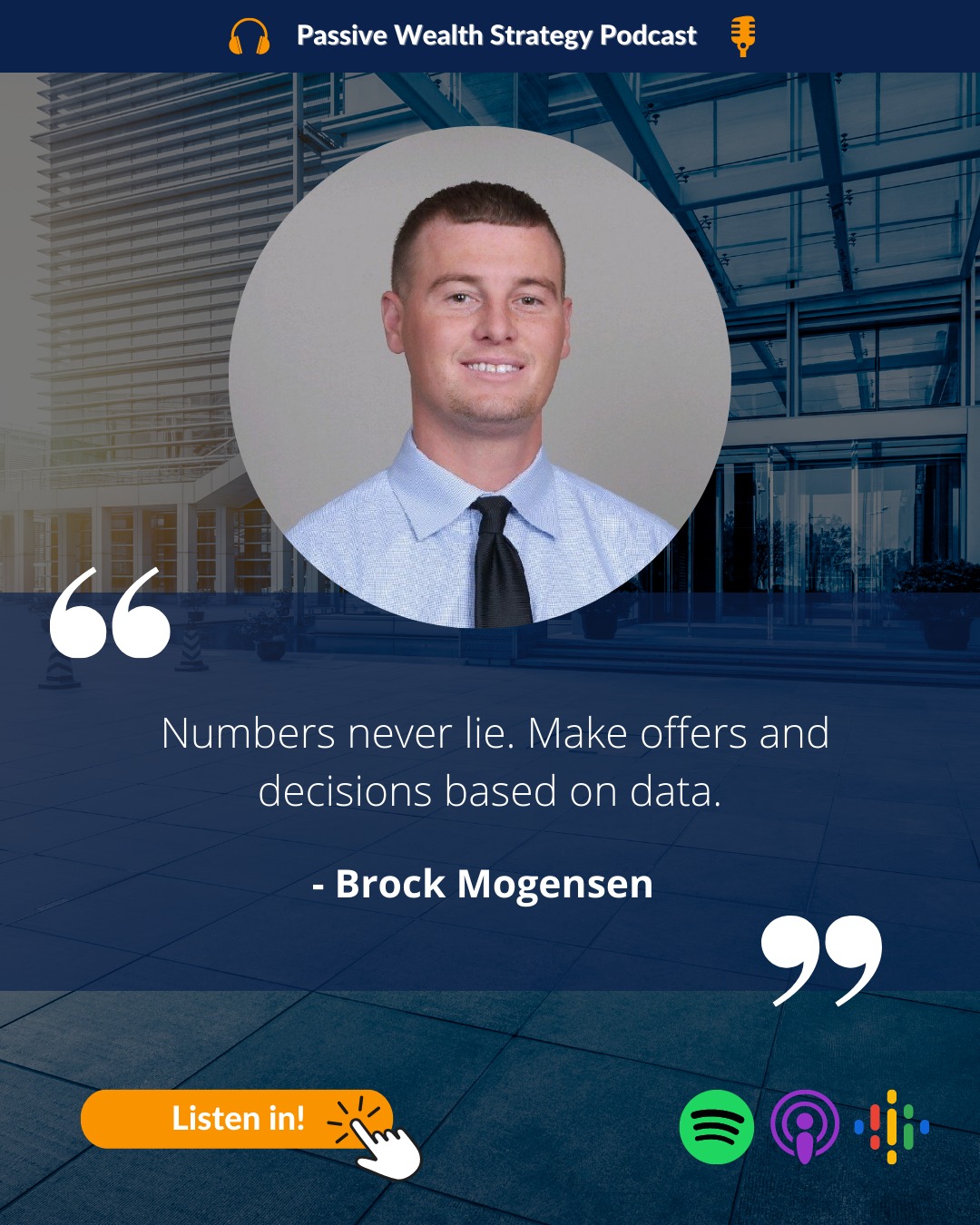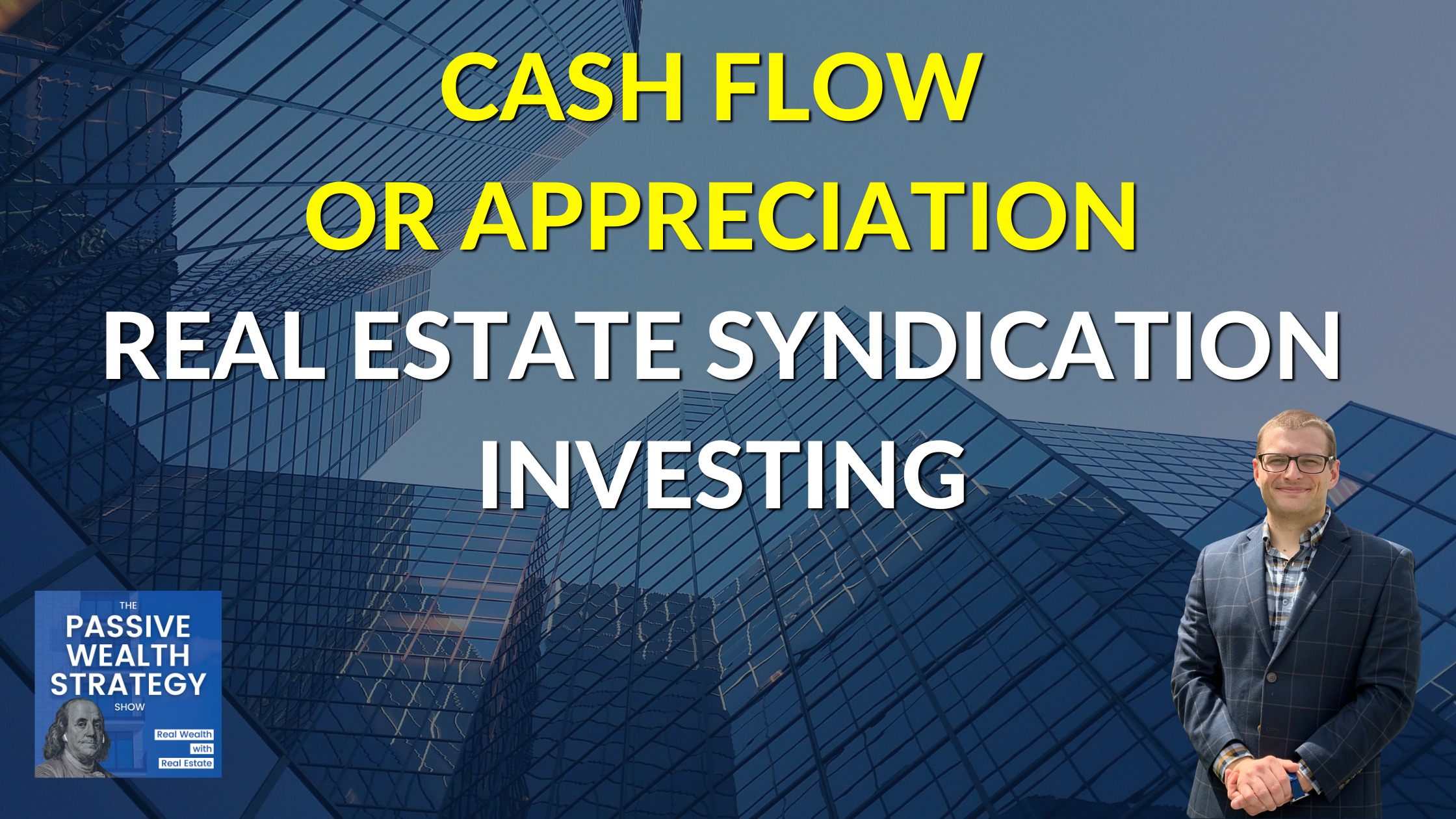Escaping the Rat Race in 3 Years: Psychology, Mindset, and Strategy with Brock Mogensen
Brock. Thank you for joining us today. Thanks for having me. It’s been great talking with you and we’ve got a few important topics. We’re going to cover here today, but for our listeners who don’t know about you and your business, can you tell us what you do?
Yeah. So I started in real estate about a little over three years ago.
Started with a duplex house hack was the first thing I did. Really not having any, live very limited knowledge about real estate or just seemed like the right thing to do. Buy an investment property. So I did that quickly realized, loved it. love the idea of cash flow in real estate is everything about it.
And from there, it was the idea of which direction do I go. Started reading the books and listen to different podcasts and everything. You quickly find out that you can flip houses, you can wholesale, you can buy single family, all, there are a million different ways to go.
And I explored different avenues for, a handful of months. And then ultimately it came across this concept of syndication, which was being able to go after these larger commercial deals and raise private equity to buy them. So that was the path I kinda spent some time researching and learning.
And then the next step was, I was, I said, okay I know I’m not going to do this all on my own. I don’t really have, the network to be able to raise all the money and all this. So let me just learn one piece of it and then see if I can partner with other operators to fill in the rest.
And that’s where I spent time learning a lot about. Analyzing deals. This specific part I spent a lot of time on is how to analyze, a real estate deal, specifically, a syndicated real estate deal. Got confident. There went out networks through various platforms and connected with one partner that led to a connection with another partner.
Three came across our first 89-year department building and we closed on it, created our partnership, and then went on to do, another five or six syndicated deals after that. So it’s been an integrated journey so far and it’s just, it’s been awesome. Being able to scale up.
That’s awesome.
And I think, if I’m using the right phrase here, we didn’t want to bury the lead too much in that amount of time, you became a full-time real estate investor, which most people, the vast majority of people do not achieve within that, that, that amount of time or even if they start investing in real estate.
So that’s very impressive that you were able to make that.
Thank you. Yeah, it was actually only a few weeks ago that I was able to leave and go full-time yeah, it took me. Probably since I started, it was three years, maybe two and a half, three years of running both and just lots of hours each week and, running both of them.
But yeah, it was nice to be able to finally walk away and have more freedom now to tell really scale it up. That’s awesome.
But now, you don’t have to be, you’re not on the clock from eight to five every day. Your workday is theoretically as much as you want it to be, which could be.
For, I’m sure you’re obsessed with this business type of person that could be 120 hours a week if you really wanted it to be some weeks. Honestly, this is not the direction that I expected to take in this interview, but I feel I have to. Yeah. Since most people don’t achieve that goal and not Everett, frankly, not everybody wants to hustle and leave their job in three years.
Some people just want to prepare for retirement or be able to pay for their kid’s college or whatever, and a few years, and they, men might not want to leave their job. And that’s fine. But for the folks out there who want to do that, I think there’s obviously, maybe not obviously something that sets people like you, who have achieved that apart from.
Those who want to get there, but never get there. Do you, would you agree with that? And if so, what do you think that separation might be?
Yeah, I think it probably really just comes down to if the person truly wants to put in the effort to be their own, real maker. I think that’s probably what, entrepreneurs here.
They really have the bug to be an entrepreneur and go after it. It’s going to take, in most scenarios gonna take a lot of work to be able to get there and be able to support, your lifestyle through, your own income. Yeah, I think it ultimately just comes down to a lot of ambition and the person’s goals in life seen a lot of people are very successful already at their job, and it really doesn’t make sense for them to leave.
So I think it is really scenario-dependent and what the person’s goals are is. Yeah, definitely understand the question. I think you see a lot of different scenarios of where we’re, how it plays out.
Yeah, absolutely. Man, we have, I’ve spoken with listeners all the time and we have a range, right?
You might have someone who’s getting fairly close to retirement and has a relatively sizable nest egg, but they’re seeing that wall street doesn’t really produce consistent income. It’s capital gain speculation in a certain way. And dividends are not particularly reliable, so they want to get in.
Real estate had some bad things like that. Or you have folks who were a bit younger and still want to have that trajectory toward retirement, but they might not have the capital to just go start acquiring assets and produce enough cash flow, to get them out of their job. So that to make up for it in hustle and drive and hard work.
I just met you. I don’t know you that well, but it sounds like you’re more, then you’re more the latter, the guy that went out there and use the hustle to maybe account for some of that difference. You can’t just go buy, assets and live off the cash flow based on the equity that you have to pump into.
Yep. Yeah. And you’re absolutely right. That was definitely the latter was was the way I went about it. It didn’t really have the big capital to start out with. There was more so a lot of sweat equity and build up and then eventually having capital put into deals, but it was yeah. A lot of slow-moving at the beginning.

Escaping the Rat Race in 3 Years: Psychology, Mindset, and Strategy with Brock Mogensen
Yeah. So what do you mean really? What do you think that means? A lot of people think they work hard. Everybody thinks they work hard at their job or at their investments. But there’s something. I think there’s something in there probably that you did. Was it partnering with your partners?
Was it, I don’t know. You have a meetup that we haven’t talked about. Is there something that separates what you’ve achieved from? I don’t know what other folks are. One. Having achieved. Yeah.
I think the partnership was huge. I was able to just, a little bit of luck, and right.
Networking and the right skillset brought me to a partner that’s already had a lot of experience already. So that definitely helped with scaling up quicker because that’s, going after these, all your deals require a lot of different experience levels, qualifying for the loans and everything. That, that was a huge part of it was a partnership.
A hundred percent not, I’ve gotten nowhere. I am today without the right partnership. I think it’s really hard to go at it alone. It’s doable for sure. But I think it’s tougher to go at it alone. So I found that the partnership was huge to get there. Meetups have also been big. We’ve drawn quite a bit off, deals, investors, several things through that meetup.
Just a combination. I Really what I’ve learned. And then something that’s flies a lot of different businesses, but I think in real estate, specifically, networking is probably like the biggest. There isn’t real estate. It’s all about connections and the right breed and the right bank or meeting the right, this person is looking to seal a deal.
It’s all about just getting out there and meeting people, whether that be through, whatever means you do it by, but just talking to as many people as you can and building connections, those lasting connections that are going to translate into, longer-term benefits.
It’s interesting that you formed this very successful partnership that has achieved some great things and will no doubt produce awesome things in the future. Awesome results in the future. I think some of the implication of that, that this partnership was successful is that you both, or, all of you, I don’t know how many there are bring different things to the table and you’re so to speak, making up for one another in certain areas.
Would you agree with that? And. What does each person maybe bring to the table? And in addition to that, I want to tack too many questions on here. Did you know that going in Hey, I need to make up for X, Y, Z, or was it did you fall into it? Like how deliberate was the whole thing? A lot of questions.
Yeah, no, and I, that’s a great question. I think I totally agree that I think the best partnerships are those that, each person has a different skillset and they all come together. Cause in any business there’s gonna be a lot of different pieces of having someone strong at one piece and someone’s trying to get their piece and it’s combining skills will.
Create the best partnerships in my opinion. So for me, like I was saying, I’m more of an analytical person, so I spent a lot more time analyzing deals. Some of the asset management stuff, tracking KPIs, like different things like that. I, at this point now, I think we all interwoven and different parts of the business and, we all kind of pitch in, in all parts.
Cause we’re learning more, more about it, me specifically we still have our own lanes. I think where we are, we thrive in my other two partners are very strong in sales. So obviously that translates well too, the capital raising stuff and just did different things, investor relations, stuff like that.
So it’s really been. The dynamic has worked well. And I think if people that are going out and looking for partnerships not to say it’s not going to work. If two sales guys get together and try doing it. But I think there is something to say about trying to find a certain dynamic where one person has specific skill sets that you need.
Another person has the other skill sets you need and combining forces can be pretty powerful.
I think the partnership was huge. Networking and the right skillset brought me to a partner that's already had a lot of experience already. So that definitely helped with scaling up quicker
- Brock Mogensen Tweet
Yeah. I think something that is very important in this discussion, particularly with our audience that we have on this show is knowing yourself and knowing whether to go this route in, the hustle and side gig until it’s, your full-time.
Or whether you’re really meant to stay in your job and just invest on the side. Do you have that? I guess entrepreneurial spark or not is big. And did you think you had that at the beginning? Clearly, you do because you did it, but how well did you know yourself when you first got started?
Yeah, I think it really, I think growing up, I always, doing all kind of always had that entrepreneurial mindset and I always knew I wanted to start something. So it was always, I knew through college, I didn’t really know what that was. Nothing ever really came to me and what I wanted to start.
I never, I think I’m like a super creative person. So I was I don’t think I’ve ever really been like invent anything or do anything cool like that. So it was always just like I got out of college and started working somewhere and the experience I got through that. I think a lot of people downplay, like the experience you get from working at a corporate job, I or any sort of job, you just, you get a ton of experience and in whatever capacity that is, that’s going to always translate well into your own business.
But I always knew I wanted to start something and it’s just, what was it? There were a few years of just going down different avenues and then trying to figure out what that wanted to be ultimately ended on, tried and true real estate. And it’s nothing super innovative.
I was trying to come up with innovative ways. We do go about our business, but it’s tried and true and it says it’s been here for a long time and creates a lot of a lot of wealth. So I think it’s a good business to be in. And that’s just where it’s okay, this is the one I’m going to choose and went all-in on it.
Nice.
So another thing I want to address here is the topic of fear in investing. And you went from house hacking a duplex with were you for listeners, you live in one unit and then rent out the other unit to doing these large deals as a general partner and investing in syndications, either directly as a passive investor, or as the general partner can be scary.
The passive investor you’re investing your money. You’re giving up a lot of control and you’re putting a lot of trust in the general. General partner. Most of the time, you’re fronting quite a bit of money to do these deals depending on the type of deal you do, it could be. Into the hundreds of thousands of dollars until the deal is closed and you get reimbursed for most, if not all of, of that money, but until then you might be out all of that money.
If everything goes south, did you feel fear about doing that? And if so, how did you allay those fears in yourself and get past those things as you especially did those first couple of deals?
Yeah, I think there is definitely a little bit of fear, going into the first one and putting up some risks like that.
But also, on the other hand, I think my approach is always to, analyze stuff very well and look at everything as a risk-reward situation. And to me, the reward outweighed the risk and it was a good idea. And eventually, you just got to take to really create anything, extraordinary.
You have to take risks and that’s my mindset on stuff. Don’t just, take risks on necessary, but if you weigh out the risk-reward and he weighs out all this, all the options and it makes sense, you just, you have to take the risk. And if, obviously it’s gonna happen.
There’s, there’s gonna be times when you lose money and stuff, doesn’t go to plan, but it’s as long as the, everything I see on paper looks, to be right, I’m going to take the
Risk. Nice. That, that risk-reward analysis can cut both ways, right? Maybe you come up to the point where, Hey there, the reward outweighs the risk.
Want to make sure I get that right? And Hey, you go for it. Or on the other side, you can also get analysis paralysis or paralysis by analysis where you’re constantly, maybe you’re coming up there. Oh, that risk is too great. I’m not going to go for it. And I’m just going to keep analyzing, I’m not going to take it out.
Did you feel that at any point and get past it or is it, is it in your DNA that, Hey, I’m going to be dispassionate once I find the reward that exceeds the risk, I’m going for it. And I’m not going to worry about it too much. What
are your thoughts about that? Yeah. Yeah, no, I think at the beginning I definitely have.
So the now sprouts is we’re looking at a deal. Yeah. It just seems like too, I don’t think I could swing this, or I don’t think I’d be like, actually get this done. But I do think there’s a fine line between the analysis paralysis and then the just being too risky.
I think it kinda has a dial-in-like rate between the two, because you don’t want to be just throwing money to, just, what weapon the numbers around. Okay. Let’s just take some riskier and assume this and that, and it works. Let’s go. And you also don’t want to just be sitting there and, weighing everything that causes if you really, you weigh out every single thing to the nitty-gritty would always be something I want in the deal that kind of scary a little bit.
So I think it’s a fine line between being able to take a little bit of risk, but also weighing out all the analysis of it to make sure you’re not taking like dumb risk. So yeah, I think that’s a great question. What I find is you gotta go right between and figure out, the sweet spot of risk and the proper analysis.

Numbers never lie. Make offers and decisions based on data.
- Brock Mogensen Tweet
So I may be reading between the lines a little bit on this a little bit too much, maybe not. And you’ll tell me if I’m right or wrong here, but a little bit earlier on, it sounded like you may allude to a time in which before you were a real estate investor, you maybe were working on some other things.
To eventually lead you to, this financial independence type of condition, if I’m right. And if I’m reading between the lines correctly, were you doing that? And if so, what were those things that ultimately didn’t work out.
Yeah, I think I never really got like super deep in anything prior in real estate. Never really started anything like that actually scaled up to where it was general income. It was more so just exploring, I was trying to think I was starting a marketing firm. It’s different stuff, more exploratory phases. And obviously, when I was really young, I probably started some stuff that didn’t work out, but I really don’t even remember shoveling someone driveways and all that.
Maybe there were some days that didn’t work out. But it was I guess I never really had like experience prior to that, where one of the things I started to really scale up that quickly was to see it not work. It was more so does a lot of like exploratory to figure out if that’s what I really wanna do.
Okay. That’s, that can go both ways, right? Because you could have somebody who’s constantly trying new things, getting really into it. And then a month later jumping to the next thing and just getting caught up. Shiny object syndrome or somebody who’s never really, I say quote, built anything like that might feel like that’s just, I’ve never done it before.
I don’t think I can do it this time. That’s obviously not the case. Everybody starts somewhere, yep.
No, I totally agree. And yeah, I probably got a little of that at the beginning when I was bouncing around with different ideas and spending four or five months exploring this idea like, oh, this actually this idea sounds better.
Let’s go over here and find it was okay. This real estate thing that’s what clicked and was like, okay, this is where I’m going to go all in.
So you’ve mentioned a couple of times that your kind of specialty in this area is, and one of the values you provide in the business is analysis, underwriting, looking at deals, things like that.
And that, that is certainly I think, a skill that can be learned incompetence that can be built over time. From the way, I take it from our conversation. And the bit I know about you is, that’s not really where you came from. It’s not what you did for a living before you got plugged into this.
How did you build that? Competence and confidence? When I get my enunciation right too. It really started getting out there and doing the deals and, presumably talking with brokers and things like that. So you can show others your underwriting and be confident that they’re not going to look at it and say, no, this is ridiculous.
I’m just going to ignore this guy. What was your question?
Yeah, totally. Yeah. I had some in my prior jobs, I had some analysts roles like I understand how to use Excel and how to analyze certain things, but nothing with numbers. I never really worked in any roles where I was analyzing numbers.
It was more so just. Trying to learn it. I started with, re you know, trying to read different books about it, listen to, videos on it. There really wasn’t much material. I think there’s more so now than back then, there’s so much material I could find, like specifically about analyzing deals.
It was a lot as a piece of things together. And the biggest thing for me was. Just going into a spreadsheet and pulling up a deal on LoopNet and just analyzing and just practicing and figuring out, okay, this is the number. It makes sense that, this is the cash-on-cash return. Okay. Then that turned into a question that you’d go and lookup.
Okay. What is the average investor expect on IRR, and stuff like that, or are you just going back and forth and just learning, getting your footsteps in? And that’s really where. I think I learned the most when it comes to analyzing deals and just doing that for say, Lily is doing that for six months, sit there for eight hours, just analyzing, four or five deals.
And that was that. That’s where I learned the most. And eventually, that turned into the confidence, start talking with brokers and, talking to them say, Hey, and I looked at this deal on this. I’m thinking X, Y, and Z. And that’s really what started building the relationships with brokers.
I do think before little side note, I think before you start really like talking with brokers, like in, in link to your conversations, understanding how the numbers work. Cause it’s definitely going to a broker will quickly be able to tell the experienced broker real quick, they’d be able to tell if you know your stuff or not.
And if you don’t know your stuff, they’re going to just throw you off to the side if and if you show them, you know what you’re talking about, it’ll it goes a long way. It kinda kick-starts here. Your relationship with the brokers, I think.
Before you start talking with brokers, understand how the numbers work. Because a broker will quickly be able to tell if you know your stuff or not. And if you don't know your stuff, they're going to just throw you off to the side if and if you show them, you know what you're talking about, it goes a long way.
- Brock Mogensen Tweet
Nice. Awesome. Right now we’re going to take a quick break for our sponsor.
All right. Brock, I’ve got three questions. I ask every guest on the show. Are you ready? I am great. First one. What is the best investment you ever made other than in your education?
I would say spending time and money into the network. Has been huge for us. Yeah.
Nice. Super important in real estate, no matter what you want to do, you want to be an active or passive investor?
You got to get out there. There are so many options, whether locally and in most of the parts of the United States, there are probably a few networking events in your area or within an hour’s drive. Or so if you’re in a more rural area or online, there are a ton of options. Now people adapted due to COVID and I don’t think that is going to go away.
I think those things will remain. We have the best investment. Now we go to the other side of that coin, the worst investment. What is the worst investment you ever have?
Right now it’s looking like this office building we bought right before COVID hit. It’s a, it’s actually it’s turned out. But yeah, I think if I had to say so that, it’s still profitable and actually still working, but the leasing office space right now has been proving to be a challenge.
I believe it. So what are some things that have you done? Have you been able to make any changes? To that business model or how you’re marketing it or anything like that to deal with that, let’s be honest, unexpected change. I didn’t expect COVID most of the people didn’t expect COVID right. What have you done?
I would say. Being flexible as in we’re a little bit more flexible at lease terms and, playing around with, that sort of stuff and rates on leases and kinda just attract tenants that way. Not necessarily, before we would, from a stance on, five-year lease terms, triple that stuff like that.
Now it’s. Being a little more flexible, just try to get him in the door and offering concessions and retooling some of the spaces, to draw in certain tenants. That’s in our play right now. I do think the office is going to bounce back a lot more than I think there’s a lot of opinions out there and whether it’s going to bounce back or not, but I do think a lot more people are learning now.
Being in the office is a little bit more productive than their Mo I think it’s, I think the hybrid thing is here to stay for sure. But I do think a lot of office space is going to, it’s going to come back, but I do think that’s gonna be like market dependent on, locations and type of office space only have as much demand as there was before for sure.
But I do think there is going to be some rebound to the office. Nice.
Hopefully. Yeah. Hopefully, my favorite question here at the end of the show is what is the most important lesson you’ve learned in business and investing?
I would say just really sticking to. Sticking to the numbers is what I’ve learned, that the numbers never lie.
If you stay true to it and only make offers and make decisions based on data numbers as has been. The biggest thing I’ve learned is, the data never really lies. And there is a lot to say about having, gut feelings on different things. But it’s, to me like staying true to numbers and data has been the biggest approach I’ve taken to.
Nice. Brock thank you for joining us today. Congratulations on your escaping of the rat race. That’s awesome. Like I said, most people want to achieve that through real estate. Don’t achieve it within three years and you did so that’s fantastic. If folks want to reach out, if they want to get in touch with you, learn more about your syndication business, or I don’t know, ask you questions about networking or, whatever, where can they find you?
Yeah. So through the website at www.smartassetcapital.com and we have some different eBooks and different kinds of stuff on there, the education material, and asset management staff, and how to build meet-up stuff like that. That’s a good resource through that contact form on there. That’ll ping me a message.
My email is also [email protected]. So I can be reached there and yeah. Feel free to reach out and let me know of any questions or if I can help them.
Nice. Awesome. Thank you once again for joining us today to everybody out there. Thank you for tuning in. If you’re enjoying the show, please leave us a rating or review on apple podcasts.
It’s very much appreciated five stars. If you don’t mind, that helps other people learn about the show. It helps us rank higher in the apple podcast ecosystem. And if I’m being. It helps me feel good. Cause I get to see that you guys are out there engaging with the content and learning alongside, all of the rest of us.
If you know anyone who could use a little bit more passive wealth in their lives, please share the show with them and bring them into the tribe. Thank you for tuning in once again. I hope you have a great rest of your day and we’ll talk to you on the next one.
Bye-bye.

About our Guest

Brock Mogensen
Brock Mogensen has been investing in real estate for about two years. He lives and invests in the Milwaukee, WI market. He holds a masters in Information Systems. Brock works full time in database marketing, while amassing a respectful real estate portfolio through syndication on the side. As a principal at Smart Asset Capital, the firm currently has over $6 Million in assets under management. This portfolio is made up of an 89 unit apartment complex, 20,000 sq ft of retail space, and 18,000 sq ft of office space. He is also a co-host of the largest monthly multifamily meetup in WI, which is the Wisconsin Apartment Investors Meetup.
Episode Show Notes
Brock Mogensen has been investing in real estate for about two years. He lives and invests in the Milwaukee, WI market. He holds a masters in Information Systems. Brock works full-time in database marketing while amassing a respectful real estate portfolio through syndication on the side. As a principal at Smart Asset Capital, the firm currently has over $6 Million in assets under management. This portfolio is made up of an 89 unit apartment complex, 20,000 sq ft of retail space, and 18,000 sq ft of office space. He is also a co-host of the largest monthly multifamily meetup in WI, which is the Wisconsin Apartment Investors Meetup.
[00:01 – 10:34] Opening Segment
- Get to know Brock Mogensen
- A duplex house hack seemed the right choice
- Brock shares his real estate beginnings and current real estate journey
- How you can follow Brock’s footsteps
[10:35 – 24:06] Escaping the Rat Race in 3 Years: Psychology, Mindset, and Strategy
- What separates Brock’s achievements from others’ achievements
- The Best Partnerships: How and Why
- Brock’s Entrepreneurial Spark
- Investing can be scary, here’s how Brock got over his fear
- Taking risks to create extraordinary things
- Experiencing analysis paralysis and being too risky
- Brock shares about his exploratory adventure
- How to Build Your Competence and Confidence
[24:07 – 32:01] Closing Segment
- Quick break for our sponsors
- Groundfloor offers short-term, high-yield real estate debt investments to the general public. Check www.passivewealthstrategy.com/groundfloor/ to get started.
- What is the best investment you’ve ever made other than your education?
- Spending time and money into networking
- Brock’s worst investment
- Their current office building
- What is the most important lesson that you’ve learned in business and investing?
- “Just really sticking to the numbers. The numbers never lie.”
- Connect with my guest. See the links below.
Tweetable Quotes:
“Networking is probably the biggest thing there is in real estate.” – Brock Mogensen
“To really create anything extraordinary, you have to take risks.” – Brock Mogensen
“Don’t just take risks unnecessarily.” – Brock Mogensen
————
Connect with Brock Mogensen through [email protected], Facebook, Instagram, and LinkedIn. Visit their website https://www.smartassetcapital.com/.
Invest passively in multiple commercial real estate assets such as apartments, self storage, medical facilities, hotels and more through https://www.passivewealthstrategy.com/crowdstreet/
Participate directly in real estate investment loans on a fractional basis. Go to www.passivewealthstrategy.com/groundfloor/ and get ready to invest on your own terms.
LEAVE A REVIEW + help someone who wants to explode their business growth by sharing this episode or click here to listen to our previous episodes







